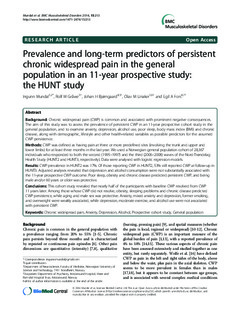| dc.description.abstract | Background: Chronic widespread pain (CWP) is common and associated with prominent negative consequences.
The aim of this study was to assess the prevalence of persistent CWP in an 11-year prospective cohort study in the
general population, and to examine anxiety, depression, alcohol use, poor sleep, body mass index (BMI) and chronic
disease, along with demographic, lifestyle and other health-related variables as possible predictors for the assumed
CWP persistence.
Methods: CWP was defined as having pain at three or more predefined sites (involving the trunk and upper and
lower limbs) for at least three months in the last year. We used a Norwegian general population cohort of 28,367
individuals who responded to both the second (1995–1997) and the third (2006–2008) waves of the Nord-Trøndelag
Health Study (HUNT2 and HUNT3, respectively). Data were analysed with logistic regression models.
Results: CWP prevalence in HUNT2 was 17%. Of those reporting CWP in HUNT2, 53% still reported CWP at follow-up in
HUNT3. Adjusted analyses revealed that depression and alcohol consumption were not substantially associated with
the 11-year prospective CWP outcome. Poor sleep, obesity and chronic disease predicted persistent CWP, and being
male and/or 60 years or older was protective.
Conclusions: This cohort study revealed that nearly half of the participants with baseline CWP resolved from CWP
11 years later. Among those whose CWP did not resolve, obesity, sleeping problems and chronic disease predicted
CWP persistence, while aging and male sex was protective. Anxiety, mixed anxiety and depression, former smoking,
and overweight were weakly associated, while depression, moderate exercise, and alcohol use were not associated
with persistent CWP. | nb_NO |

